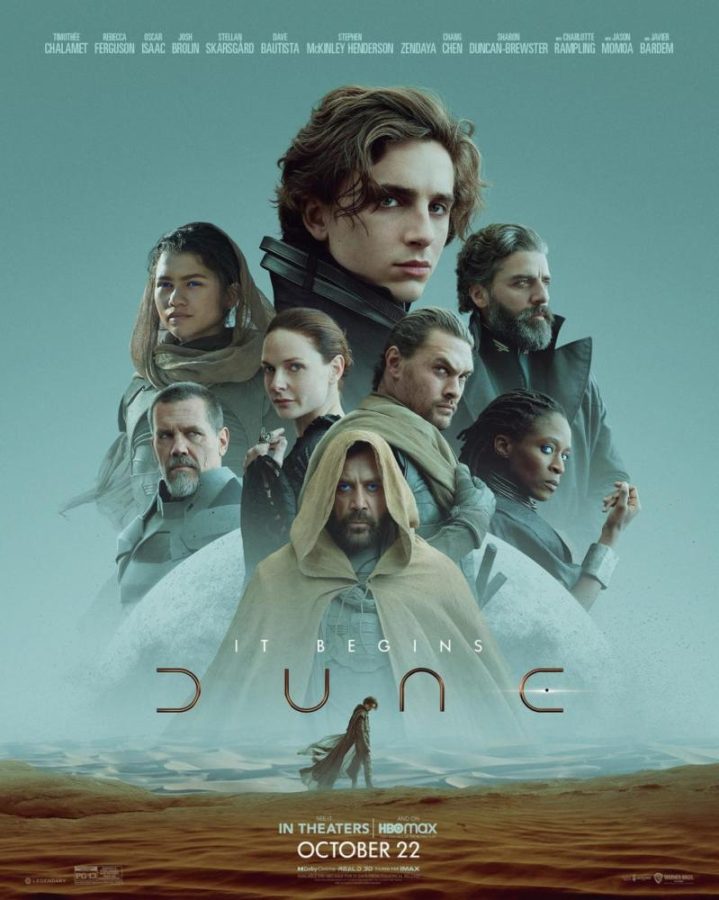Dune. The novel written by Frank Herbert in 1965 follows Paul Atreides, the 15-year-old heir to House Atreides in a space empire set far into the future. His family is forced by the Emperor who rules this Known Universe to leave their home planet, Caladan, to take control of the desert planet Arrakis.
I started reading Dune on October 1st. The inspiration for committing to an 893-page book hit me when I saw the first film adaptation trailer. I finished it a good half a month later—give or take a few days. And let me tell you, what a giant commitment that was.
Overall, it was a fairly decent science fiction novel. Most of the characters were interesting and the world-building was outstanding. Violence and the use of laser guns were prevalent throughout. However, the best attribute of Dune is awarded to the meticulous planning that went into it. The time put into the novel and its setting is obvious from the very beginning. The religious, political, and ecological systems are the real stars of the show. So much so that the last 100 pages of the mass market paperback are dedicated to appendices. Each one takes their time to explain these different systems and how they work on the planet Arrakis. So if you’re a person who tends to be drawn towards novels driven by plot and action, I’d sit this one out.
To be honest, if someone were to ask me what happened throughout the book I wouldn’t be able to tell them. The only things I would be able to specifically mention would be the trinity of water, worms, and spice. Water because it’s a rare resource found on Arrakis and is the cause of many profound sayings and religious practices. Worms because, well, there are giant worms that burrow beneath the sand and have a tendency to attack and eat everything that moves. This may sound a little strange to those who have no previous knowledge as to what I’m talking about, but I wish that Dune went deeper into what the worm’s purposes and roles are in this desert society. Please provide me with more worm clarity. I’d then wrap up this fake conversation by bringing up the spice. The valuable and profitable resource found only on Arrakis that acts as a catalyst for political unrest throughout the whole story.
To put all of my thoughts in one place and give my final words of wisdom pertaining to Dune the novel, my final rating was 4/5 stars. While the characters didn’t undergo much development nor have my particular sense of humor, they were enjoyable enough to read about. The world and the systems in it were beautifully done and were interesting in themselves. However, the use of a particular time skip and the “chosen boy” trope didn’t do it for me. It added confusion that obviously needs adapting to and a sense of cliche in an otherwise original story. That being said, I must’ve enjoyed Dune enough to write an article featuring it and its movie counterpart.
Time to talk film.
Coming from a person who has read the novel and who is purely basing her opinions on first impressions, it was great! I enjoyed going to the movie theatre and spending a ridiculous amount of money on tickets and food. (Sidenote: The online convenience fee for AMC is dumb.)
Surprisingly, the film stayed true to the novel in many different ways. It was almost as if they used the book itself as a script. The characters and settings were just as described and just as imagined. Almost creepily so.
The film is a perfect adaptation of the book and also is a good choice for those who just want another science fiction film to enjoy over the weekend. However, just as in the novel, the movie moves at a slower pace. It takes a little while for the actual action to start. A lot of energy while watching is dedicated to remembering history, making connections between characters, and trying to make sense of the political games and power plays. So, once again, if you’re a person who’d rather jump straight into spaceships and violence…I don’t think this one’s for you.
As another slight critique as well as a genuine question: Why is it so loud? Watching movies in the theatre always comes with the guarantee of loud action sequences, but I feel like Dune went slightly overboard. I swear some of the explosions shook me to my core. And while the soundtrack for the film is absolutely amazing and I’m in love with every piece, it’s almost impossible to hear the character’s dialogue. It’s definitely something to watch with subtitles.
Naturally, I think the casting was amazing as well. We have Timothee Chalamet as Paul Atreides, Rebecca Furguson as Lady Jessica, Oscar Issac as Leto Atreides, Jason Momoa as Duncan Idaho, and Zendaya as Chani. And while half of the scenes featuring Timothee Chalamet is him smoldering into the camera, I’m not ashamed to admit that I still enjoyed it. Another relative complaint I’ve run into on the interwebs is the lack of screen time that Zendaya receives. And while I agree that it was strange to have the multiple trailers present that she would have a major part in the film, I don’t see the huge issue with this. Zendaya’s character, Chani, doesn’t play a part nor shows up at all in the half of the novel the film went over. I expect that she’ll have a more influential part to play in the next movie.
To give my final words on both of these works, I enjoyed them both immensely. I’ll admit that at times it took a little bit of patience to get through scenes, but I’m still impressed by the effort and the turn-out of the novel and the film. Dune, in my opinion, is an interesting sci-fi universe that I can’t wait to learn more about. And I, for one, am completely ready to strap in for the six-book Dune series. And for those who don’t enjoy the written word, here’s to looking forward to Timothee and Zendaya in Dune: Part Two. It’s going to be a good time, to say the least.




